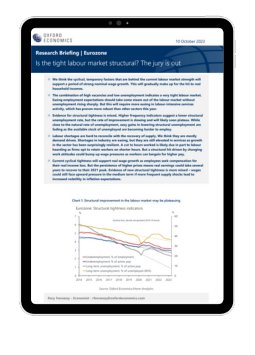Eurozone: Is the tight labour market structural? The jury is out

We think the cyclical, temporary factors that are behind the current labour market strength will support a period of strong nominal wage growth. This will gradually make up for the hit to real household incomes.
What you will learn:
- The combination of high vacancies and low unemployment indicates a very tight labour market. Easing employment expectations should take some steam out of the labour market without unemployment rising sharply.
- Evidence for structural tightness is mixed. Higher frequency indicators suggest a lower structural unemployment rate, but the rate of improvement is slowing and will likely soon plateau.
- Labour shortages are hard to reconcile with the recovery of supply. We think they are mostly demand driven. Shortages in industry are easing, but they are still elevated in services as growth in the sector has been surprisingly resilient.
- Current cyclical tightness will support real wage growth as employees seek compensation for their real income loss. But the persistence of higher prices means real earnings could take several years to recover to their 2021 peak.
Tags:
Related Posts

Big challenges remain for CRE development viability in the UK
Financial pressures from surging material costs and supply chain disruption are easing in the UK, but we remain downbeat on the viability of UK commercial real estate development.
Find Out More
Mild Eurozone house price correction call still faces downside risks
We expect eurozone house prices will continue to slide through 2023 following back-to-back declines in Q1 2023 and Q4 2022. Moreover, while the cumulative 2.5% decline to Q1 was driven primarily by Germany, we think price falls will become broader.
Find Out More
Europe: City employment growth eases, but office sectors still lead
Labour markets in European cities have shown remarkable resilience over the last few years, and employment in office-based sectors especially so. But from this year onwards, we expect the pace of office employment growth to slow.
Find Out More
Recovery imbalances across regions, with more difficulties ahead
We have cut our forecast for UK GDP growth in 2024 to 0.4%, from 1.3% three months ago. We expect that all regions will avoid a contraction this year, albeit some such as Scotland more narrowly than others.
Find Out More